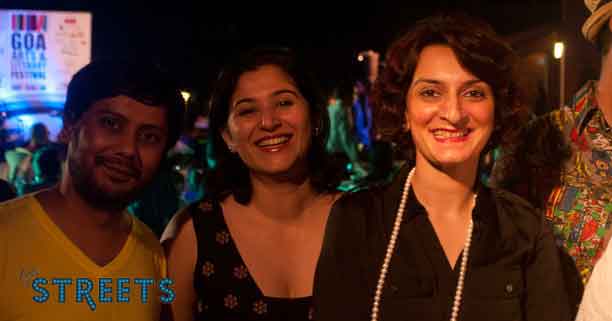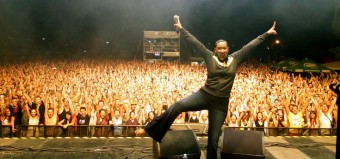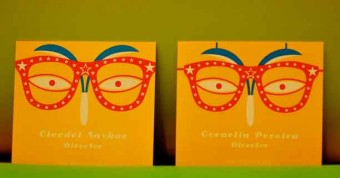Pakistani delegates to Literary Festival (from left) Cyril Almeida of Dawn newspaper and
Afia Aslam and Nimra Bucha of the Desi Writers’ Lounge.
Robust crowd, help fascinating sessions and a memorable experience
When I first started attending the annual ‘LitFest’ four years ago, drug my first reaction was ‘what the heck is that?’ I mean in a film festival one sees films. Surely one can’t sit reading books at a LitFest, I thought (the scene in my head was highly anti-social!).
It didn’t take long, however, for me to realize it was a noteworthy event. Volunteer driven, with a small budget, it had managed to get to Goa some impressive names: Mridula Garg and Gulzar, for example. Over three days, I heard them talk about their books, and also discuss matters of national and cultural interest. Of interest to me was the fact that I could sit and chat with the authors in the lawns, under the benign December sun, on topics like “is the short story really a form of literature”? After Alice Munro’s Nobel, the answer is clearly ‘yes’.
Last year, the GALF as the Goa Art and Literary Festival has come to be known, clashed with events at the university and the audience number was less than expected. Good for those like me who like informal chats with writers, painters and performers. 2012 was the first time in the country that a Kashmiri writers’ contingent had been invited to another state. I was able to interact with people who had lived through years of terrible hardship. Reading about their troubles in the newspapers was very different from asking them questions face to face. The extempore play and theatre workshop run by Kolkata’s Tathagat was another exciting event as was the meeting with an ex IAS author from Arunachal. This, I reckoned is the best form of armchair travel. There were more treats: a poetry recital at sunset at Raj Bhavan, followed by a traditional folk dance-drama from Kashmir. And, as had happened the year before, GALF had ended with a music program by Lou Majaw, popularly known as the Bob Dylan of the North East. In his sixties, with waist-length white hair and a twenty-year-old athlete’s body, he sang and strummed his guitar with passion, the dark Zuari flowing below and behind him and the starlit sky above. His ‘uniform’ was a very short, fray-edged denim shorts, sleeveless vest and jacket.
Friends from other states who attended the GALF last year almost decided to settle here, so attractive was the festival at the International Centre at Dona Paula. Non-commercial, intimate, stimulating.
This year, I marked the dates on my calendar well in advance. The registration, as always, was free and optional. For an event so valuable, a small fee could be charged and, going by the number of attendees this year, registration should be compulsory. Yes, fortunately for the organizers, the attendance this year was robust.

Sheela Jaywant (right) with Neerja Mattoo
On 4th December, at the Institute Menezes Braganza, Maria Aurora Couto launched “Filomena’s Journeys: A Portrait of a Marriage, a Family and a Culture”. There were more than twenty books launched over four days. Am hoping the ICG library has bought them all because I couldn’t buy them all.
On the next day, at the formal inauguration at the Kala Academy, there was the unavoidable lot of speeches. More books were launched: by authors Lord Meghnad Desai, Meera Kosambi and Damodar Mauzo. There was a dance performance by the famous Uttar Kamalabari Satra troupe from the largest river island in the world, the Brahmaputra’s Majuli island. I told you I armchair travelled sitting right here in Goa. Then there was a rather ordinary Konkani play. We have the talent, the skill, the art. We should put our best foot forward at times like these. Sigh.
Meena Kandaswamy read her poetry with passion. That’s the only way to read her verse (shocking to some, exciting to others). Also discussed was Nandita Haksar’s “Travels Through the Chicken’s Neck”, which is likely to be read by anyone interested in Nagaland and its sister states. She has made Goa her home. Bina Ramani, whose daughter Malini’s shop Dreamscapes is right down the road from the Streets’ office, earned fame through her difficult days as witness to Jessica Lal’s murder. She penned her experiences in jail and in dealing with the mighty monsters of Power in Delhi in “Bird in a Banyan Tree”. Sikkim’s Prajwal Parajuly had come here but a few months ago to launch his award-winning “A Gorkha’s Daughter”; this time he was here with his novel, “Land Where I Flee”.
I’d grown up on a literary diet of short stories by Shashi Deshpande. Seeing her, meeting her, made me feel like a student again. She told us of her journey: how, where, when, why, did she write and about whom. I wish the invited, outside authors had been given as much time as was given for the launch of “Taalgudi, Ghusmat and Clear Cut”.

Poet Arvind Krishna Mehrotra
Jose Lourenco, as always quiet and modest, didn’t tell people that the story of the film “Zor” was his. Goans are extremes. The ones who are modest are overtly so and the others…. Let me move on to the next para.
The cookery books were launched appropriately at a fancy dinner at a fancy hotel. Samar Halarnkar’s “A Married Man’s Guide to Creative Cooking” won’t need much marketing to sell out.
The talks about life, language, politics and troubles were engaging. From Assam to Kashmir to Pakistan to Dalits in Tamil Nadu, one got to ask questions to people who were from there.
Claude and Norma Alvares’ son, Rahul, told us how long each picture took in his “Birds of Goa”. George Menezes’ “The Naked Liberal” was a collection of his hard-hitting, satirical essays.
On the 7th, Mandela died. Raj Bhavan couldn’t host the evening function there as it did last year. But the poetry readings on the ICG lawns, under Goa’s winter sky were only marginally less charming. I’m going to watch out for Konkani poet Rajay Pawar’s work. It has humour, is earthy and hard-hitting.
Patricia Sethi, an ex chief correspondent of Newsweek, launched Ramesh Chauhan’s biography, aptly titled: “Thunder Unbottled: From Thums Up to Bisleri”.
Most people went home laden with author-signed mint-fresh books, pleased that the festive season will give them the opportunity to spend their afternoons and late nights more fruitfully than watching tear-jerking serials on television.
Compared to Jaipur, Trivandrum and Mumbai, GALF is small, without glitter, without tamasha. That’s what makes it charming and special. Looking forward to the fifth edition next year.





Very good site you have here but I was curious about if you knew of any coniummty forums that cover the same topics talked about here? I’d really love to be a part of online coniummty where I can get feed-back from other knowledgeable individuals that share the same interest. If you have any suggestions, please let me know. Bless you!